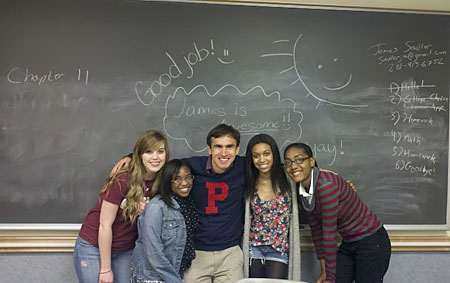James Sadler, C’13, is a man with a passion. A political science major with a minor in urban education, Sadler has been engaging with the Philadelphia school system since his freshman year, volunteering in various schools as well as writing an 89-page report that Joseph P. Tierney, executive director of the School’s Fox Leadership Program, has called “the best research paper that I’ve ever read for a freshman.”
Sadler’s paper, titled “Defining Success: A Case Study of Three ‘Successful’ High Schools in Inner City Philadelphia,” analyzes distinctive ways to measure success, such as Pennsylvania System of School Assessment Test (PSSA) scores. For his research, Sadler looked at three high schools that were deemed successful: Strawberry Mansion High School; Mathematics, Civics and Sciences Charter School (MCSCS); and West Philadelphia Catholic High School. Over the course of the summer-long project, Sadler spent hours visiting and observing the schools, interviewing principals, assistant principals, counselors, teachers, and other educators. He looked at variables like parental satisfaction, SAT scores, college acceptance, and school structure and philosophy.
Sadler found that West Catholic had high parental acceptance, graduation, and college enrollment rates. The school’s seniors were admitted to some of the finest institutions in the country, including New York University and Penn. “That tells me that these higher education institutions trust the education that’s provided [at West Catholic],” he says.
The Strawberry Mansion staff was united around one philosophy and believed in a rigorous framework. But while researching the school, Sadler says he noticed a very huge spike in their PSSA scores. He says he found it “a little bit suspicious,” but assumed the scores were legitimate. However, Strawberry Mansion was one of the schools flagged by the Pennsylvania Department of Education for suspicious PSSA results in both reading and math.
Sadler says the PSSA scores for MCSCS were not much better than typical neighborhood high schools, but the school is very safe and clean. “I could definitely see why parents would choose MCSCS as an alternative to more dangerous schools,” he says.
When writing the paper, Sadler says he was a proponent of using the PSSAs to gauge success. He has since wavered from that belief. “Before I thought it was useful because I thought that success really meant that you were able to have basic math and reading skills, and also have the ability to explore and get inspired by other educational opportunities,” he says. “But I didn’t realize at the time that those two are almost contradictory to each other.”
Sadler says the knowledge and qualitative research experience he obtained through writing the paper, and the insight into how the School District of Philadelphia functions has opened doors to many other opportunities, including an internship with Public Citizens for Children and Youth. He envisions a career in urban education. “The policy issues really, really interest me,” he says.



